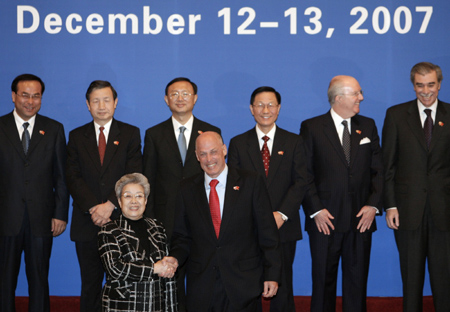China firmly opposes any attempt to politicize trade issues, Vice Premier Wu Yi said Wednesday.
"Politicizing trade issues will harm the interests of not just one side, but both sides," Wu said at the opening ceremony of the Third China-U.S. Strategic Economic Dialogue (SED) held in Beijing on Dec. 12 and 13.
US Treasury Secretary Henry Paulson shakes hands with Chinese Vice-Premier Wu Yi (L) during the opening of The Third Strategic Economic Dialogue in Xianghe, near Beijing, December 12, 2007. [Agencies]
"Thanks to accelerated economic globalization, the growing China-U.S. business relations featuring interdependence, mutual benefit and win-win progress have brought our two peoples increasingly closer to each other," the Chinese vice premier said.
"We all hope that both our economies will enjoy sustained growth so as to create more opportunities to expand cooperation in the interest of our respective development," she added.
"This is why we must not allow some interest groups to harm our win-win business relations in pursuit of their selfish interests," she added.
Wu also expressed her concern over the 50 or so protectionist China-related bills introduced in the U.S. Congress, saying that "I need to be quite candid about this: If these bills are adopted, they will severely undermine U.S. business ties with China."
U.S. Treasury Secretary Henry Paulson, Secretary of Commerce Carlos Gutierrez and Trade Representative Ambassador Susan Schwab sent a joint letter to the U.S. Congress on July 30, rightly pointing out these moves can only be "counter-productive."
About 160 U.S. multinational corporations and industry associations, including Microsoft, Wal-Mart, Citibank and Coco-cola, also sent a joint letter to the Congress on Sept. 26, emphasizing the U.S. trade sanctions against China would only cause negative impact rather than a positive one.
Wu said, "I hope that the U.S. administration, the Congress and the media will heed the voice of the business community."
"I hope they will not lose sight of the larger interests of the United States, follow the historical trend of economic globalization, appreciate the importance of its overall relations with China and the mutually beneficial nature of our business ties, and pursue the right trade policy so as to enable our two peoples to gain more from the continuous growth of China-U.S. business relations," she added.
Handle issue of food safety in a creative way
Wu Yi said China and the United States should properly address new issues emerging in the course of the growth of bilateral business ties, turn difficulties and challenges into opportunities for cooperation and develop China-U.S. business ties in both depth and width.
China-U.S. business relationship is the most complex one in today's world owing to its huge scale, broad scope and the extensive interests of various parties involved.
"This requires us to view this relationship from a strategic height, demonstrate greater vision and courage, and adopt more effective policy measures to handle in a creative way issues that have occurred as our business ties expand," said the Chinese vice premier.
"We should endeavor to turn difficulties and challenges into opportunities for cooperation, and add new momentum to the growth of our business relations," she added.
Wu took the issue of product quality and food safety as an example, saying that "as economic globalization gathers momentum, product quality and food safety have become a global issue."
This means that the countries concerned must increase cooperation, assume their due responsibilities and strengthen related mechanisms to ensure the quality and safety of people's life, she said.
Before this round of the Dialogue, China and the United States have signed the Memorandum of Agreement on Food and Feed Safety and the Agreement on the Safety of Drugs and Medical Devices.
With regard to China-U.S. trade imbalance, Wu reiterated that China has no intention to seek large trade surplus with the United States, saying that "our policy is to maintain a basic balance in international payments."
Wu said "to address China-U.S. trade imbalance requires the concerted efforts of both sides," and called on the United States to relax export control over export of high-tech products for civilian use to China.
"This is in your own interest. China has been the fastest growing export market for the United States for five years, and there is great potential for increasing U.S. export to China," Wu said.
She said China's policy toward the U.S. import is very clear, and its door is wide open to American products. "The key is what policy the United States should pursue. Whether the United States can increase its export to China hinges on what policy it will follow," she said.
(Xinhua News Agency December 12, 2007)



